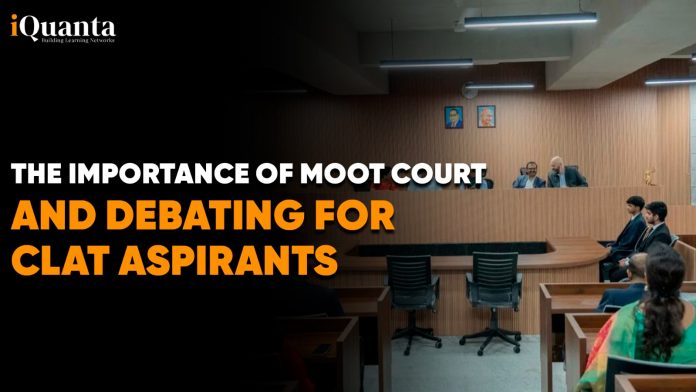In order to know the importance of moot court the candidates must know about what is moot court. Moot Court is a type of legal education that involves researching, writing and presenting the oral arguments on a given legal problem or issues. The term moot refers to open discussion and reflects the fact that moot courts are usually based on controversial or unsettled areas of law. The cases of moot court covers any branch of law for example international law, criminal law, constitutional law, human rights law, etc. This is not only a co-curricular activity but also a valuable learning experience for law students.

Importance of Moot Court
Moot Courts are very important for law students as they offer practical legal skills, oral advocacy, courtroom experience, opportunities for honing research. Candidates participating in moot court enhances a student’s resume and provides a competitive edge in the legal market making them well prepared for a successful career in law.
Advantages of Participating in Moot Court
The law students will get a lot of advantages by participating in moot court competitions. Check below the listed advantages:
Gain both written and oral advocacy skills
Students are required to prepare written memorials or memoranda for both sides of the case that are usually judged before the oral rounds. In order to write a good memorial the students must be able to identify the relevant issues, research the applicable laws and precedents, apply them to the facts of the case, and then present them in a clear and concise manner. This will also help the students to improve their formatting, citation and editing skills.
Oral Advocacy is the most important aspect of moot court where the students get to present their arguments before a panel of judges who will ask them several questions and comments. For oral advocacy the students are required to have thorough knowledge of the case, the law, and the facts and also the ability to communicate effectively, respond to questions confidently, and answer to the opponent’s arguments logically. Oral advocacy will also help the students to develop their voice modulation, public speaking, body language, and etiquette skills in the courtroom.

Engage in Legal Analysis in Various Areas of Law
The problems of moot court are usually based on unsettled or emerging areas of law such as constitutional law, international law, human rights law, arbitration law, etc. Students get an opportunity to explore the areas of law in depth and apply them to real life scenarios. Students will be able to develop their analytical and critical thinking skills as they have to identify the strengths and weaknesses of both the sides of the case, formulate their own arguments accordingly, anticipate the counter arguments of the opponent, etc
Understand the Legal Issues from Different Perspectives
Mooting requires the students to argue from both sides of the case both convincingly and impartially. This helps the students to understand the legal issues from different ways and appreciate the diversity of legal reasoning. Mooting encourages the students to be open minded and be respectful towards different viewpoints and opinions.
Participating in moot court is just like an important activity for law students. Its just like a practice for future lawyers. When students get to engage in moot court they get to learn many important skills so that they can start working as lawyers easily


